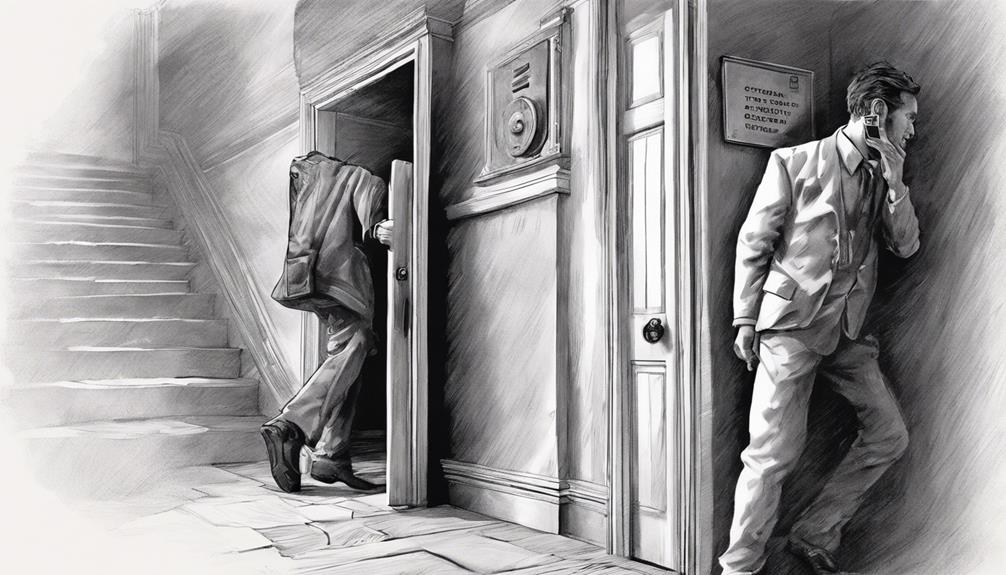As you peel an onion, you uncover new layers, similarly uncovering the complexities of a relationship. Have you ever had a sense that something was off, yet couldn’t quite identify what it was?
Our spouse's behavior can sometimes leave us questioning. In this discussion, we will uncover subtle signs that might shed light on a deeper truth about your partner.
Key Takeaways
- Excessive need for admiration and validation
- Lack of empathy and emotional distance
- Manipulative and controlling behaviors like gaslighting
- Avoidance of accountability and shifting blame
Excessive Need for Admiration

Exhibiting an insatiable desire for constant praise and validation, individuals with a covert narcissistic personality often display an excessive need for admiration. These individuals seek approval and adulation from those around them to validate their self-worth and inflate their ego. They often fish for compliments, constantly seeking reassurance and affirmation of their superiority. This behavior can be exhausting for those in their inner circle, as the need for admiration can become all-consuming, leaving little room for genuine connections based on mutual respect and understanding.
It's essential to recognize the signs of an excessive need for admiration in individuals with covert narcissism to establish healthy boundaries and protect one's emotional well-being. By understanding this trait, one can navigate relationships with these individuals more effectively, setting limits on the constant demand for validation while still showing empathy and compassion. Remember, it's crucial to prioritize your own mental health and not bear the burden of constantly feeding someone else's insatiable need for admiration.
Lack of Empathy
Demonstrating a lack of empathy, individuals with covert narcissistic traits often struggle to understand or connect with the emotions and experiences of others. This can manifest in various ways, such as dismissing or belittling the feelings of those around them, showing little interest in the well-being of others, and failing to provide support during challenging times. When someone lacks empathy, it can create a sense of isolation and emotional distance in relationships, leaving the other person feeling unheard and unimportant.
In interactions with a person exhibiting covert narcissistic behavior, you may notice a pattern of self-centeredness and a tendency to steer conversations back to themselves. Empathy involves actively listening, validating feelings, and showing compassion, qualities that are often lacking in individuals with covert narcissism. Understanding these signs can help in identifying and addressing the emotional dynamics at play, fostering healthier relationships built on mutual respect and empathy.
Secretive Behavior

In relationships with individuals displaying covert narcissistic traits, observing secretive behavior can be a key indicator of deeper underlying issues. It's essential to pay attention to signs of secrecy as they may signify manipulative tendencies or a lack of trust within the relationship. Here are some behaviors to look out for:
- Hiding Information: Constantly keeping information or activities from you can indicate a lack of transparency and honesty.
- Protecting Privacy Excessively: While privacy is important, excessive guarding of personal information may raise concerns about the intentions behind the secrecy.
- Avoiding Open Communication: Refusing to have open and honest conversations about certain topics can suggest a desire to control the narrative.
- Making Excuses for Secrecy: Justifying secretive behavior with excuses that don't align with the situation could be a red flag for manipulative tendencies.
Being aware of these signs can help you address potential issues in the relationship and seek the necessary support.
Gaslighting Tendencies

If secrecy in a relationship with a covert narcissist raises concerns, observing gaslighting tendencies can provide further insight into manipulative behaviors. Gaslighting is a form of psychological manipulation where the abuser makes the victim doubt their own thoughts, feelings, and reality. It often involves the narcissist denying something they previously said or did, making the victim question their memory or perception of events. This can lead to confusion, self-doubt, and a sense of isolation for the victim.
Gaslighting can manifest in various ways, such as the narcissist trivializing the victim's feelings, shifting blame onto the victim, or even outright denying events that occurred. It creates a power dynamic where the narcissist holds control over the victim's reality, making them more susceptible to manipulation. Recognizing these gaslighting tendencies is crucial in understanding the extent of emotional abuse in the relationship and taking steps to protect oneself from further harm.
If you find yourself constantly questioning your own sanity or memories in your relationship, it may be a red flag for gaslighting behavior that warrants further exploration.
Difficulty With Criticism

When dealing with a covert narcissist, it's crucial to recognize their difficulty with criticism. They often show extreme sensitivity to feedback, becoming defensive when faced with critique.
Moreover, instead of taking responsibility, they tend to shift blame onto others for their mistakes.
Sensitivity to Feedback
Understanding how covert narcissists react to feedback can be eye-opening, revealing their deep discomfort with criticism. When providing feedback to someone showing covert narcissistic traits, it's essential to approach the situation with care and understanding.
Here are some key points to consider:
- Defensiveness: Criticisms can be met with deflection or denial.
- Emotional Reactivity: Feedback may trigger intense emotional responses.
- Blaming Others: They may shift blame onto others instead of taking responsibility.
- Avoidance: Some covert narcissists may avoid feedback altogether to protect their self-image.
Defensive When Criticized
Experiencing defensiveness when criticized is a common trait observed in individuals with covert narcissistic tendencies. When confronted with feedback, individuals with these tendencies often struggle to accept it gracefully, reacting defensively instead. This defensiveness can stem from an underlying fragility in their self-image, causing them to perceive criticism as a threat to their ego. Understanding this behavior can help navigate interactions with such individuals more effectively. Below is a table summarizing signs of defensiveness when criticized:
| Signs of Defensiveness When Criticized |
|---|
| Becoming agitated or angry |
| Justifying their actions excessively |
| Shifting blame onto others |
Blames Others for Mistakes
Navigating interactions with individuals exhibiting covert narcissistic tendencies can be challenging due to their tendency to blame others for mistakes, which reflects a difficulty in handling criticism gracefully. This behavior can create a toxic dynamic in relationships, leading to feelings of frustration and inadequacy. When faced with a partner who consistently shifts blame onto others, it's essential to approach the situation with empathy and understanding.
Here are some key points to consider:
- Encourage open communication to address issues constructively.
- Establish boundaries to protect your emotional well-being.
- Seek support from a therapist or counselor to navigate challenging interactions.
- Reflect on your own needs and feelings to maintain a sense of self-worth.
Manipulative Tendencies

As we explore the topic of 'Manipulative Tendencies' in covert narcissists, it's crucial to recognize gaslighting behaviors and emotional blackmail tactics as key warning signs.
These insidious tactics can leave individuals feeling confused, doubting their own reality, and emotionally drained.
Understanding these manipulative tendencies is essential in safeguarding oneself from the subtle but damaging effects of covert narcissistic behavior.
Gaslighting Behaviors Explained
Understanding gaslighting behaviors is crucial in recognizing manipulative tendencies often exhibited by covert narcissists. Gaslighting is a form of manipulation that makes the victim doubt their own thoughts, feelings, and reality.
Here are four key behaviors associated with gaslighting:
- Denying: The narcissist denies their actions or manipulations, making the victim question their perceptions.
- Twisting: They twist the truth or facts to make the victim feel confused and uncertain.
- Blaming: By shifting blame onto the victim, the narcissist avoids taking responsibility for their actions.
- Minimizing: They downplay the victim's feelings or experiences, making them feel insignificant and invalidated.
Recognizing these behaviors can help individuals identify and address gaslighting in their relationships.
Emotional Blackmail Tactics
Gaslighting behaviors are often intertwined with emotional blackmail tactics employed by covert narcissists to manipulate and control their victims.
Emotional blackmail involves using guilt, fear, and obligation to coerce someone into doing what the manipulator wants. This tactic can be subtle, making it challenging to recognize at first.
Victims of emotional blackmail may feel trapped, constantly walking on eggshells to avoid triggering the manipulator's wrath. It can lead to feelings of confusion, self-doubt, and low self-worth. Recognizing these tactics is crucial to breaking free from the cycle of manipulation.
If you suspect you're being emotionally blackmailed, seek support from trusted friends, family, or a mental health professional who can help you navigate this difficult situation with empathy and understanding.
Superiority Complex

Exhibiting a sense of entitlement and belittling others to inflate their own sense of importance, individuals with a superiority complex may often display behaviors indicative of covert narcissism. It can be challenging to navigate relationships with those who possess a superiority complex, as their behavior can be manipulative and emotionally draining. Here are some key behaviors to watch out for:
- Constant Need for Admiration: Individuals with a superiority complex often seek excessive praise and admiration from those around them, constantly needing validation to boost their ego.
- Dismissive Attitude: They may frequently dismiss others' opinions, feelings, or accomplishments, considering themselves as the ultimate authority on any matter.
- Competitive Nature: Always striving to outperform others, they engage in a subtle or overt competition to establish their superiority.
- Lack of Empathy: Understanding and empathizing with others' emotions can be challenging for individuals with a superiority complex, as they tend to prioritize their needs above all else.
Lack of Accountability

When someone consistently shifts blame onto others and refuses to take responsibility for their actions, it can be a red flag for covert narcissism. This lack of accountability can manifest in a variety of situations, from personal relationships to professional settings.
It's important to recognize this behavior early on to protect oneself from potential manipulation and emotional harm.
Blames Others Frequently
Frequent blaming of others can be a noticeable trait in individuals who lack accountability. This behavior can have detrimental effects on relationships and personal growth. When someone frequently shifts blame onto others, it creates a toxic dynamic that undermines trust and communication. Here are some key points to consider:
- Lack of personal responsibility: Constantly blaming others may indicate an unwillingness to take ownership of one's actions.
- Avoidance of introspection: Individuals who frequently blame others often avoid reflecting on their own behavior.
- Impact on relationships: Blaming others can strain relationships and create tension and resentment.
- Stifled personal growth: Without acknowledging faults, personal growth and self-improvement become challenging.
Recognizing these patterns can help in addressing and potentially resolving such behaviors.
Denies Responsibility for Actions
Shifting blame onto others can be a sign of a lack of accountability, which may manifest in individuals denying responsibility for their actions. When someone consistently avoids owning up to their mistakes or the consequences of their behavior, it can create tension and distrust within relationships. Denying responsibility not only hinders personal growth but also prevents genuine resolution of conflicts. It may lead to a pattern of excuses, deflection, and manipulation, making it challenging to address issues effectively.
In such situations, open communication and setting clear boundaries become crucial. Encouraging accountability in a supportive manner can help individuals recognize the impact of their actions and foster healthier interactions. Remember, everyone makes mistakes, but taking responsibility is a vital step towards self-improvement and maintaining healthy relationships.
Emotional Volatility

Navigating a relationship with someone exhibiting emotional volatility can be challenging and emotionally draining. It's important to recognize the signs early on to protect your own mental and emotional well-being. Here are some key indicators of emotional volatility in a partner:
- Frequent Mood Swings: Rapid and extreme changes in mood without a clear trigger can be a sign of emotional instability.
- Overreactions to Minor Issues: If your partner reacts disproportionately to small inconveniences or disagreements, it may indicate underlying emotional volatility.
- Intense Anger or Anxiety: Outbursts of intense anger, anxiety, or panic attacks that seem to come out of nowhere can be indicative of emotional volatility.
- Difficulty Regulating Emotions: A consistent inability to regulate emotions or calm down after a stressful situation could signal emotional volatility.
Understanding these signs can help you navigate the challenges that come with a partner's emotional volatility and make informed decisions about your relationship.
Difficulty With Boundaries

Establishing and maintaining healthy boundaries is crucial when dealing with a partner who struggles with setting limits or respecting personal space. In relationships with individuals exhibiting covert narcissistic traits, difficulties with boundaries can manifest in various ways. These individuals may invade personal space, disregard privacy, or manipulate situations to suit their needs without considering the impact on their partner. This behavior can lead to feelings of suffocation, low self-worth, and a sense of constantly walking on eggshells.
Recognizing these boundary issues is the first step towards addressing them. It's essential to communicate openly and assertively about personal limits and expectations. Setting clear boundaries and consistently reinforcing them can help protect your emotional well-being and maintain a sense of individuality within the relationship. Seeking support from a therapist or counselor can also provide valuable guidance on establishing healthy boundaries and navigating difficult conversations with a partner who struggles in this area. Remember, your feelings and needs are valid, and prioritizing your emotional health is essential in any relationship.
Frequently Asked Questions
How Can I Differentiate Between a Covert Narcissist and Someone Who Is Just Insecure and Seeking Validation?
When trying to differentiate between a covert narcissist and someone seeking validation, it's essential to examine their patterns of behavior.
Covert narcissists often display manipulative tendencies, lack empathy, and prioritize their needs above others', while those seeking validation may exhibit insecurity but are typically more open to feedback and self-reflection.
Is It Common for Covert Narcissists to Have a History of Traumatic Experiences or Mental Health Issues?
When exploring the origins of covert narcissism, it's intriguing to consider the interplay between past traumas or mental health challenges.
While not a universal truth, some covert narcissists may indeed have a history of such experiences.
These challenging circumstances could potentially contribute to the development of covert narcissistic traits as a coping mechanism.
Understanding this complexity can shed light on the multifaceted nature of this personality trait.
Are There Any Specific Red Flags to Look Out for in Terms of Secretive Behavior That May Indicate Covert Narcissism?
Absolutely, there are specific red flags to watch for when it comes to secretive behavior and covert narcissism. Some indicators include:
- Excessive lying
- Manipulation
- Lack of empathy
- Constant need for control
These behaviors can manifest in subtle ways, making it challenging to recognize them at first. It's crucial to trust your instincts and observe patterns of behavior over time to determine if they align with covert narcissistic tendencies.
Can Covert Narcissists Ever Change or Seek Help for Their Behavior, or Is It a Lifelong Personality Trait?
Absolutely, some covert narcissists can change and seek help. Just like a seed that can grow into a beautiful flower with the right nurturing, individuals with this trait can undergo transformation through therapy, self-reflection, and a genuine desire to change.
It's not easy, but with dedication and support, positive change is possible. The willingness to seek help and work on oneself plays a significant role in the potential for growth and change.
How Can I Protect Myself and Set Boundaries With a Covert Narcissistic Partner Without Escalating the Situation?
Setting boundaries with a covert narcissistic partner is crucial for our well-being.
We can protect ourselves by clearly communicating our limits, staying firm in our boundaries, and seeking support from trusted individuals or professionals.
It's essential to prioritize our mental and emotional health while navigating this challenging situation.
How can I tell if my husband’s behavior is a sign of covert narcissism?
If you find yourself constantly questioning your husband’s actions and feeling manipulated, you may be unraveling his true intentions. Covert narcissism can manifest in subtle ways, such as gaslighting and emotional manipulation. Trust your instincts and seek support if you suspect toxic behavior in your relationship.
Conclusion
In conclusion, it's important to trust our instincts and recognize the warning signs of covert narcissism in our partners. By being aware of behaviors such as excessive need for admiration, lack of empathy, and difficulty with boundaries, we can take steps to protect our emotional well-being.
Remember, it's never selfish to prioritize your own mental health and set boundaries with those who exhibit toxic behavior. Trust your gut, and don't be afraid to seek support if needed.









